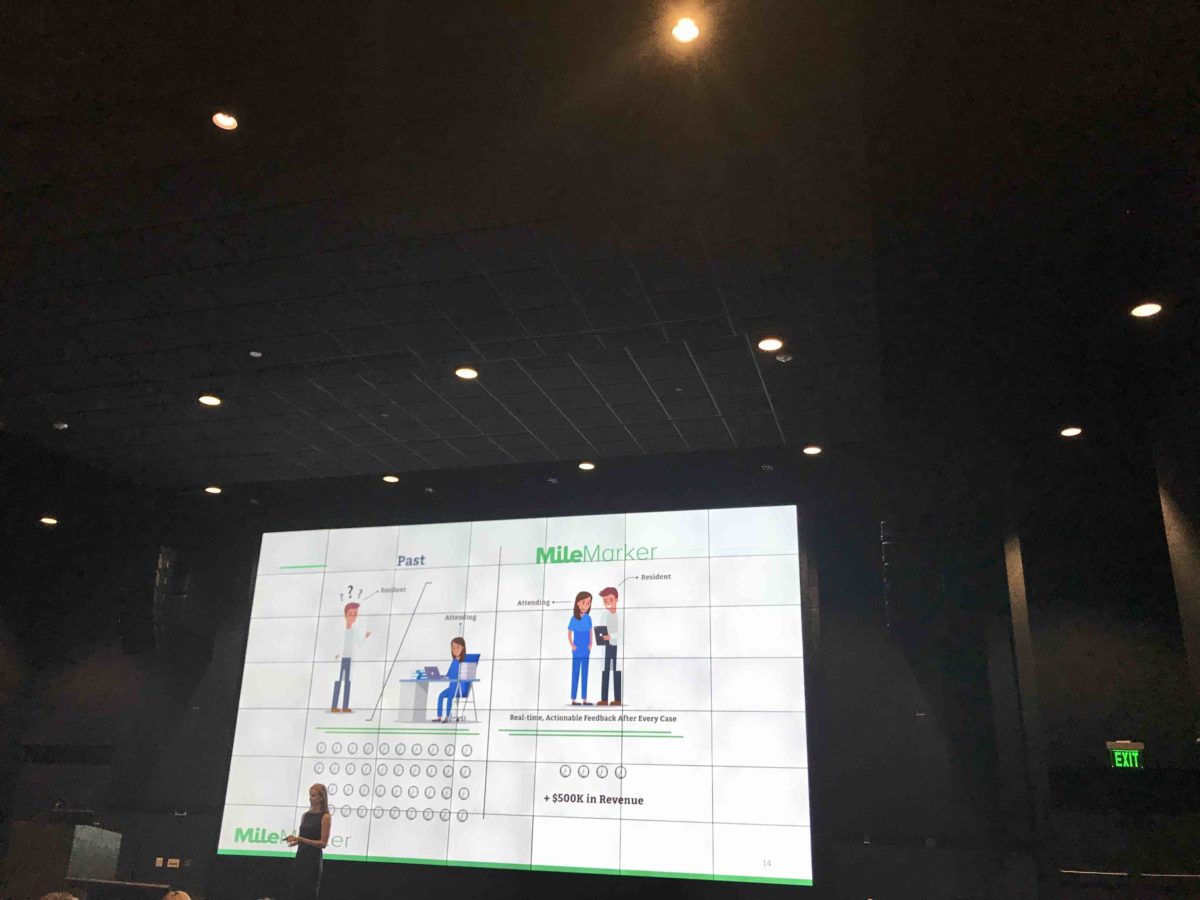The auditorium inside Under Armour’s Building 37 had the big screen primed for pitch slides, and intrigued tech community members in the seats.
To begin the night, entrepreneur and author Patrick Vlaskovits talked about what sets startups apart through a story involving a fly.
“All of a startup’s basic motivations and actions and behaviors center around their perception of time,” he said. “A year is an eternity to a startup.”
With those elements, the Wednesday night event to close out the first M-1 Ventures cohort had the look of many a demo day. As the pitches proceeded, it followed a familiar format, albeit focused on connected health and fitness in line with the accelerator’s charge.
But along the way, there were a couple differences that stood out.
As with many pitch nights, there were winners. Fitness platform BurnAlong and health data platform b.well each picked up $25,000.
The path to choosing the winners took a slightly different approach. Along with Johns Hopkins, VilCap Communities was a partner on the accelerator. With the latter’s involvement, the members of the cohort used Village Capital’s peer review model to select who would be the winner.
The pitches also had a focus on making money – revenue, that is, rather than investment. Paul Singh, an investor who co-directed the digital health and fitness-focused accelerator that was housed at Johns Hopkins Fast Forward East this fall, noted it was a key focus of the accelerator.
“Everything we did over the last four months was focused on sales,” he said, noting that’s a distinct difference from focusing on the technology and innovation.
In part that may be a result of the needs of the companies Singh and co-director Tony D’Agostino were assisting. Accelerator programs often bring in companies at the earliest stages, but the M-1 Ventures companies already had working products, funding and revenue. So sales are what they need to grow.
The pitches bared that out. b.well CEO Kristen Valdes reported an increase on that front. “We have gone from pipeline to firehose mode,” she said.
b.well is expanding to a digital health wallet in 2018 pic.twitter.com/aZohrcsr7u
— Technical.ly Baltimore (@TechnicallyBMR) December 13, 2017
Pitching BurnAlong, co-CEO Mike Kott talked about the company’s five-year revenue plan.
After eating and drinking in December, BurnAlong is ready for fitness-based New Year’s resolutions pic.twitter.com/0nWzSnvLca
— Technical.ly Baltimore (@TechnicallyBMR) December 13, 2017
For the companies, the focus also meant a change in mindset.
While talking about how Philly-based RoundTrip is a “a single touchpoint that applies for the ordering of medical transportation” and how the company worked with Johns Hopkins to add predictive analytics features, CEO Mark Switaj had a fresh characterization of the company.
“We want to be a sales machine that happens to be doing transportation,” he said, adding that the company entered four new states during the cohort.
At demo day for @m1venture accelerator, roundtrip CEO Mark Switaj says nonemergency medical transport company focused on being a “sales machine” pic.twitter.com/oc17SiKcCi
— Technical.ly Baltimore (@TechnicallyBMR) December 13, 2017
A similar note came from Aimee Martin, who leads the surgical training platform Milemarker. which was developed by surgeons at Johns Hopkins and the University of Maryland. She talked about an increase in sales leads from five to 200. “We are a sales company through and through,” she said.
Aimee Martin of Milemarker says surgical training platform started in plastic surgery but can be applied to other areas pic.twitter.com/doZITxovkm
— Technical.ly Baltimore (@TechnicallyBMR) December 13, 2017
It’s an approach that Singh and D’Agostino encouraged. While those who pitched were health and fitness companies, it’s easy to see how that focus could be applied to any startup in the city. The customer development focus was also a focus at this month’s closing of ETC’s Pioneer Baltimore program, where the winner was the company that had the most customer contacts.
It underlines the point that while building a company has a lot of moving parts, growth is always front and center for startups.
Before you go...
Please consider supporting Technical.ly to keep our independent journalism strong. Unlike most business-focused media outlets, we don’t have a paywall. Instead, we count on your personal and organizational support.
3 ways to support our work:- Contribute to the Journalism Fund. Charitable giving ensures our information remains free and accessible for residents to discover workforce programs and entrepreneurship pathways. This includes philanthropic grants and individual tax-deductible donations from readers like you.
- Use our Preferred Partners. Our directory of vetted providers offers high-quality recommendations for services our readers need, and each referral supports our journalism.
- Use our services. If you need entrepreneurs and tech leaders to buy your services, are seeking technologists to hire or want more professionals to know about your ecosystem, Technical.ly has the biggest and most engaged audience in the mid-Atlantic. We help companies tell their stories and answer big questions to meet and serve our community.
Join our growing Slack community
Join 5,000 tech professionals and entrepreneurs in our community Slack today!

The person charged in the UnitedHealthcare CEO shooting had a ton of tech connections

From rejection to innovation: How I built a tool to beat AI hiring algorithms at their own game

Where are the country’s most vibrant tech and startup communities?



